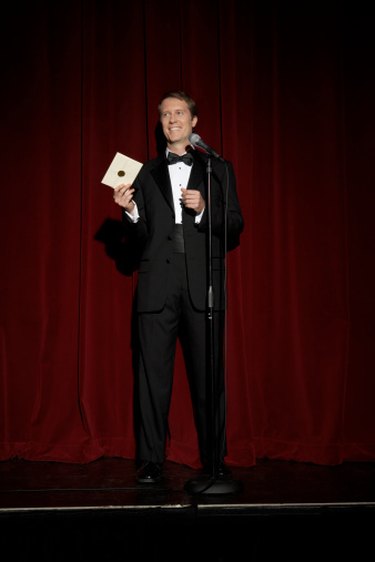
The master of ceremonies, or "emcee," of an event or program acts as the host who keeps the time moving. An emcee introduces different parts of a program and fills in space with jokes or interesting facts between acts that perhaps need a little time to prepare the stage for their presentation.
Introductions
Video of the Day
As an emcee, you will most likely be giving the introduction to the evening. A short, succinct introduction that rolls things along right into the rest of the program works best for everyone involved. If you ramble on at the beginning of a program it can drain the energy from the room and lead to an impatient crowd and delay the start of the program that everyone came to see. Stay on topic and start the program with energy.
Video of the Day
Preparation
You must come to a program or event prepared. You need to have a script to follow so you can keep things moving along smoothly and announce the sequence of events correctly. When introducing people, get as much information about them as you can. You may be great at spontaneous humor, but it's best to have prepared jokes written out ahead of time. Emcees are expected to know the program front and back.
Comedy
Whether it's a wedding, a company event or school program, people love a funny emcee. Even if you are not a funny person, you can find tons of jokes and ideas for funny things to say on the Internet. Get a joke book or even go to another program and watch the emcee for ideas on how to get the audience laughing. Humor relaxes the audience and helps them forget about the time.
Transition
Emcees need to keep a flow to the program, transitioning from one part to the next. If you are given one minute to introduce the next part of the program, keep to that time. There may be times, however, when you need to fill in some entertainment due to unforeseen circumstances that have occurred. Have extra jokes and even short one or two minute bits in case you need to fill some time and keep the audience entertained while organizers sort out problems.
Emcee Etiquette
Know your audience. Do not be too generic or use too much canned material; include humorous information about the people in the program or notable guests of honor. Specific humor goes over well with special events. Be sure not to offend anyone; ask beforehand if you think a joke might be too offensive for the audience. Ask what's expected of you as far as escorting people on and off stage and where you should be at all times.